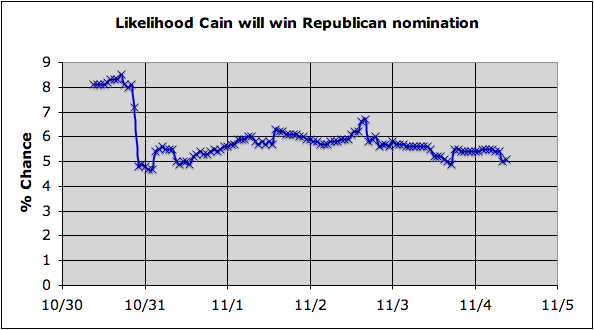 The Ticket
The TicketHarassment allegations vs. shifting denials: What hurt Herman Cain more?
It's an axiom in politics: Denying an accusation that turns out to be true can inflict more damage on a politician than the revelation itself. Bill Clinton dug himself into a public and ultimately legal hole in 1998 less for his philandering than for his lying about his philandering. In June, New York congressman Anthony Weiner resigned under pressure after insisting for more than a week that the lewd photos he posted on Twitter were the handiwork of a nonexistent hacker.
Herman Cain's turn to play defense began Sunday, when a Politico investigation revealed evidence that, while Cain was president and CEO of the National Restaurant Association, the group settled at least two lawsuits accusing him of sexual harassment.
At first, Cain denied knowledge of the details or even the existence of the settlements. "If the restaurant association did a settlement, I wasn't even aware of it and I hope it wasn't for much," he told Fox News on the morning of Oct. 31. "If there was a settlement, it was handled by some of the other officers at the restaurant association."
By that evening, Cain acknowledged, in an interview on PBS, that he "was aware that an agreement was reached", and by the morning of Nov. 1, he told the news channel HLN he would take back his initial denial if he could, explaining that, "after 12 hours during the day, many events, many interviews, I was gradually able to recall more and more details about what happened."
Cain's reversal was swifter and far less dramatic than either Clinton's or Weiner's, but it still offers us an opportunity to investigate whether the candidate's election hopes were at all affected by the allegation or Cain's shifting explanation.
On prediction markets like Betfair and Intrade, election watchers bet real money on who will win the Republican nomination, shifting money in and out of candidates when events like Cain's scandal erupt and unfold. By tracking how energetically traders sold their stakes in Cain in the wake of Politico's report and in the days that followed, we can get a measure of how harmful the allegations were for Cain and how well he is controlling the damage.
Between 8 p.m. and 10 p.m. on Oct. 30, Cain's chances of winning the Republican nomination--computed as an average of Betfair and Intrade -- dropped precipitously, from 8.1 percent to 4.8 percent. By cutting his likelihood of winning the nomination nearly in half in the span of two hours, traders sent a strong message that the charges of sexual misconduct were a serious, and potentially fatal, problem for Cain.
In the days following the report, Cain's denials and un-denials--and his waxing about the meaning of the word "settlement" versus "agreement," reminiscent of Clinton's "meaning of 'is,' is"--didn't seem to hurt him further. By Nov. 2, Cain's chances had recovered somewhat, to around 6 percent, before retreating again to about 5 percent, where his odds in the prediction markets stand today.
There is an important caveat about this type of analysis. Prediction markets, like all financial markets, only tell us what they think (e.g., Cain's chance of winning the Republican presidential nomination is 5 percent), not why they are thinking it. Market swings can and often do arise from a combination of factors, and several other meaningful events for Cain occurred in roughly the same span of time. Polls on Oct. 29 and Oct. 31 showed Cain in the lead or tied for the lead in Iowa and Texas, even as allegations emerged that Cain may have used illegal funds in the early days of his campaign.
The shorter the time window, the more comfortable I am attributing a market shift to a specific event. Given that Cain's prospects on the prediction markets collapsed in a matter of hours, it seems clear that traders were reacting to the sexual harassment questions provoked by Politico's report and felt the allegations represented a serious threat to Cain's candidacy.
And although no one--not even Cain himself--would call his subsequent response perfect, his actions in the days following the report and others factors on the campaign trail have at least not magnified the problem. Another axiom in politics: there are no axioms.
David Pennock has a Ph.D. in computer science from the University of Michigan and currently heads the algorithmic economics group at Yahoo! Research. Follow him on twitter @pennockd.
Other popular Yahoo! News stories:
Cain considering lawsuit against Politico for publishing harassment story
Taking a serious look at Newt Gingrich
Jack Abramoff: Lobbyists are smarter than Congress
Want more of our best political stories? Visit The Ticket or connect with us on Facebook and follow us on Twitter.


